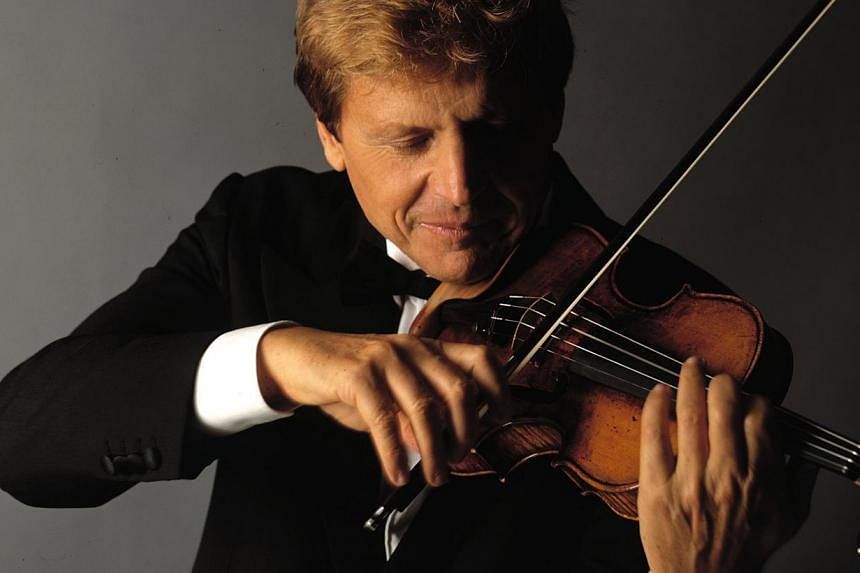After 67 years playing the violin, Italian maestro Uto Ughi still never goes a day without practising.
"If I don't practise for a day, I notice. If I don't practise for two days, the others notice," the 71-year-old says on the telephone from Rome, ahead of his March 19 concert here at the Victoria Concert Hall.
He is paraphrasing another great Italian violinist, 19th-century composer and performer Niccolo Paganini, but Ughi perhaps has more in common with another of his countrymen, Giuseppe Tartini. Tartini's 18th-century sonata The Devil's Trill, one of the most famous written for the violin, is a key attraction of Ughi's performance in Singapore.
The Devil's Trill, as Ughi explains, came from a dream Tartini had, of hearing the devil playing the violin so exquisitely that the composer woke desperate to recreate the music.
"The things he heard in that dream were so beautiful that he would have broken the violin to pieces out of rage that he couldn't reach that highest beauty," he says.
Ughi's 2013 memoir Quel Diavolo Di Un Trillo - Note Della Mia Vita (The Devil's Trill - Notes From My Life) pays homage in the title to Tartini's quest for exquisite melody because Ughi too has devoted his entire life to creating beautiful music, starting from the first time he picked up a violin at age four.
"I was burnt by the fire of love of music," he says. "I was passionately involved with music, I didn't think of anything else."
It is a passion that admits no others. Though he married young, the relationship did not last in part because of his focus on music. "When you have a great love, unless you are an unfaithful person, love might last all your life, unless you divorce," he says. "I never divorced from music."
As he was born to a musical family in Milan, there was luckily never any question of him following in his lawyer father's footsteps in spite of the economic turmoil and general poverty in the country after World War II.
His parents understood his vocation because his father played the violin, his mother sang and their friends included several musicians from the famous La Scala opera house in Milan.
The first violin from La Scala was Ughi's earliest teacher. Others included George Enescu, the famous Romanian composer and musician who also taught violinist Yehudi Menuhin.
Ughi also studied for a decade at the iconic Accademia Musicale Chigiana in Siena in Tuscany, whose alumni include famous conductors Claudio Abbado and Daniel Barenboim.
Ughi was only seven when he gave his first public concert in Milan but his performing career took off with tours of major European capitals when he was 15.
He has appeared under the baton of notable conductors such as Colin Davis, Mstislav Rostropovich and Zubin Mehta, and with world-famous orchestras such as the New York Philharmonic, the London Symphony Orchestra and the Royal Concertgebouw of Amsterdam.
Much of his career has been devoted to education and popularising classical music and he was recently appointed by the Italian prime minister's office to helm a committee promoting music among youth.
Apart from founding classical music festivals in Venice and Rome - Homage To Venice to raise funds to restore the city's monuments and the 2013 Uto Ughi For Rome - Ughi also helmed a series for Italian television in the noughties, Uto Ughi Racconta la Musica (Uto Ughi Tells The Music) to introduce the history and techniques behind famous pieces such as Vivaldi's Four Seasons Concertos.
His desire to educate leads to this interview being largely a discourse on the compositions he will play here on his fabled 1744 Guarneri del Gesu violin. The programme includes Four Romantic Pieces (Dvorak), Carmen Fantasy (Sarasate), Introduction and Rondo Capriccioso (Saint-Saens) and Beethoven's famous Kreutzer Sonata, which Ughi will play with his long-term musical collaborator, Italian pianist Bruno Canino.
Ughi speaks of the sonata as "a very intense struggle between piano and violin", pointing out that Napoleon's invasion of Europe would have been a strong influence on Beethoven as he composed.
"The first time Kreutzer performed the sonata, it was a fiasco," he says with a chuckle, referring to the French violinist Rodolphe Kreutzer, whom Beethoven dedicated the sonata to. "The audience didn't enjoy the piece at all, they said it was strange, noisy, hysterical." He owns a 1701 Stradivarius played by Kreutzer but is unlikely to bring that here.
A lover of long walks in natural surroundings, he says he plans to arrive a few days early in Singapore to recover from jet lag and renew his acquaintance with the city and its parks. He has visited twice and performed in 1997 at Raffles Hotel's Jubilee Hall and 2002 at Victoria Concert Hall.
The extra time here will also give him time to get in a few practice sessions - though one of the world's most established musicians, he thinks it is important to never let one's guard down.
"If you're a professional player, you have to practise many hours every day," he says. "How many hours? It depends on the performance."

